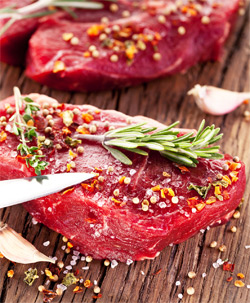
It might look good, but whats added to beef, pork and poultry has the attention of the CDC and hospitals all over the U.S.!
Amy Collins, MD, Senior Clinical Advisor for Health Care Without Harm in Boston, told Ivanhoe, 80-percent of the antibiotics used in this country are used in animal agriculture. Thats 30-million pounds of antibiotics used every year to treat animals that arent even sick.
Antibiotics are fed to livestock to prevent disease and promote growth. While its not a new practice Dr. Collins says its time to stop.
This practice of giving them low-dose antibiotics in their food on a daily basis is the perfect opportunity to breed antibiotic-resistant bacteria Dr. Collins said.
These antibiotic-resistant bacteria from meats can be passed on to you and me making once treatable conditions more problematic.
Tom Wagstaff, Director of Nutrition and Food Services for Spaulding Rehabilitation Hospital in Boston told Ivanhoe, There are many patients who are difficult to treat because they have resistance to antibiotics.
Government tests of raw supermarket meat found antibiotic-resistant bacteria in 81-percent of ground turkey, 69-percent of pork chops, 55-percent of ground beef and 39-percent of chicken.
Spearheaded by Health Care Without Harm, hospitals around the U.S. like Spaulding Rehabilitation are now serving meat antibiotic-free.
Wagstaff said, In the long run, it is far more efficient in healthcare to purchase antibiotic-free meat than it is to have patients stay longer in hospitals. A practice they hope other hospitals, restaurants, and supermarkets will follow.
So what should you look for? Experts recommend buying meat labeled USDA certified organic. And if youre handling raw meat, make sure to wash your hands.